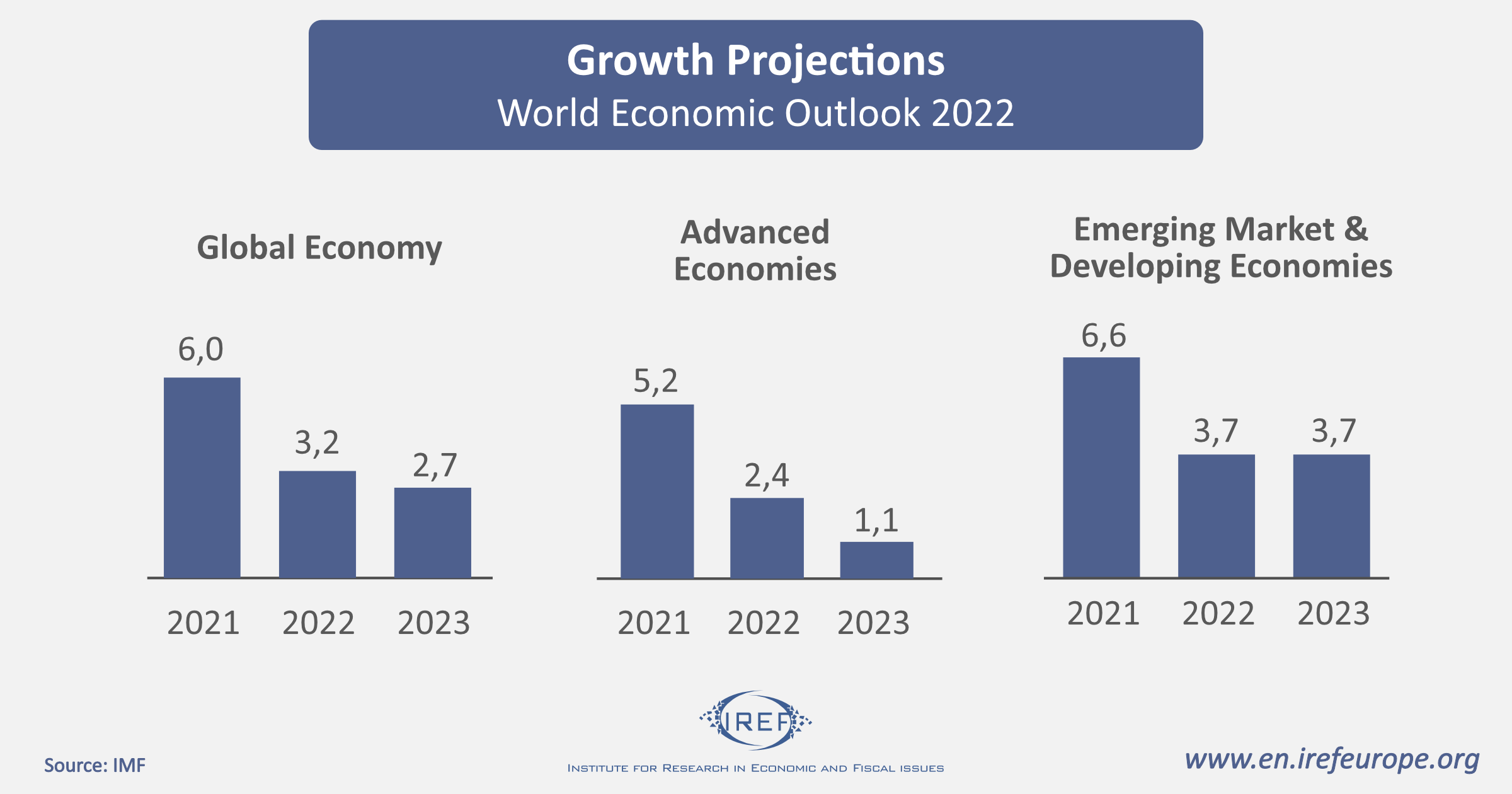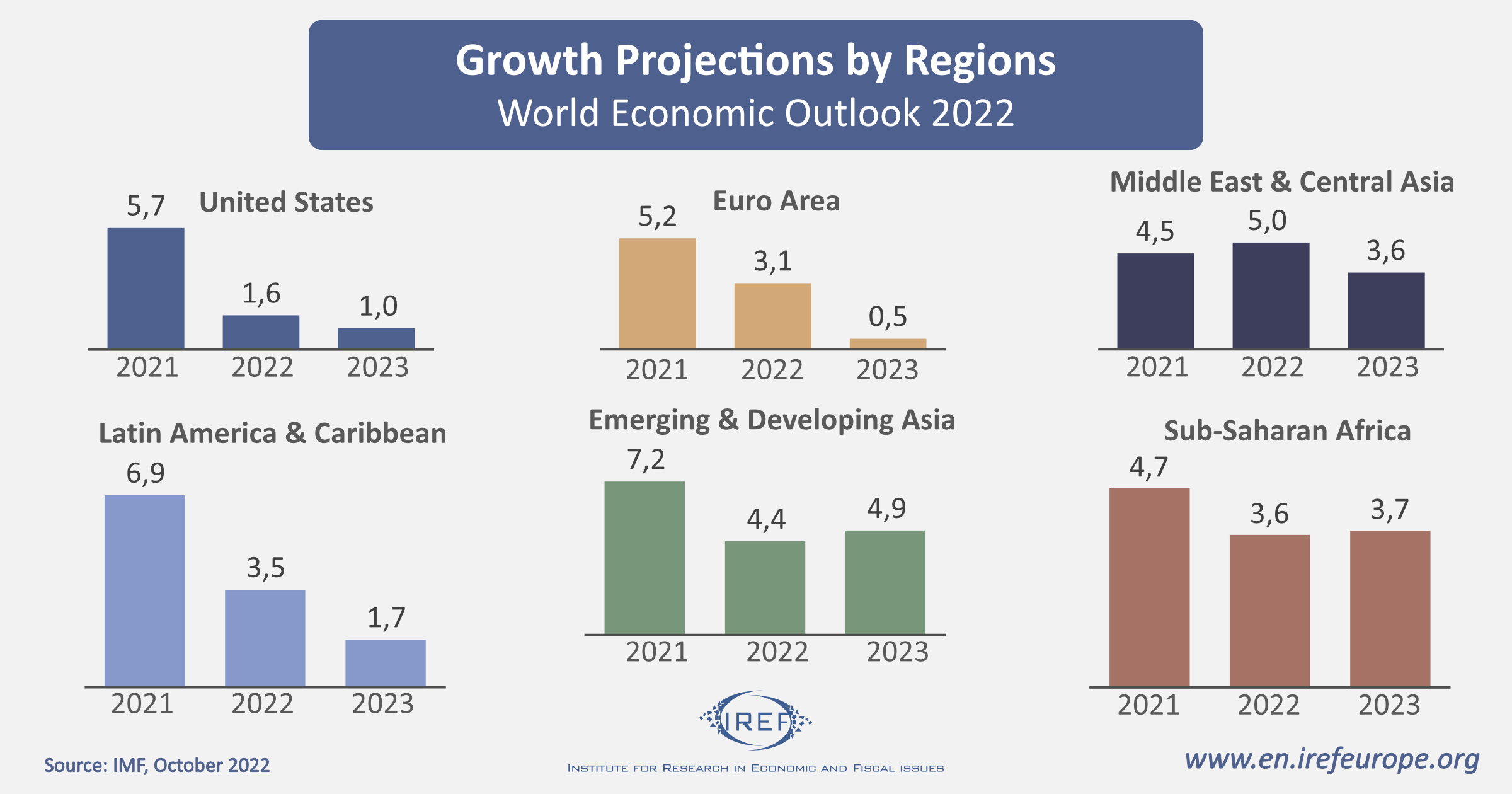Background
Global economic activity is expected to slow down because of record-high inflation, large public budget deficits and debts, conflicts between monetary and fiscal policy targets, and lower central banks’ credibility. Experts also underscore the consequences of the Russian invasion of Ukraine, which gradually altered several OECD countries’ energy and trade policies; the ongoing COVID-19 pandemic policy in China with its zero COVID approach; and the controversial Climate Change issues, which apparently justify a variety of restrictive policy decisions in the energy sector.
The IMF’s World Outlook notes: “Policy trade-offs to address the cost-of-living crisis have become acutely challenging. The risk of monetary, fiscal, or financial policy miscalibration has risen sharply at a time when the world economy remains historically fragile and financial markets are showing signs of stress”.1 As a result, the IMF predicts a slowdown in global growth from 6.0 percent in 2021 to 3.2 percent in 2022 and 2.7 percent in 2023. The forecasts for the advanced economies (2.4% in 2022 and 1.1% in 2023), especially for the USA (3.2% in 2022 and 2.7% in 2023), and the EU (3.1% and 1%, respectively) were particularly dubious. The IMF also predicts that global inflation will decline moderately: from 8.8 percent in 2022 to 6.5 percent in 2023 and 4.1 percent in 2024.


According to the IMF, “Monetary policy should stay the course to restore price stability, and fiscal policy should aim to alleviate the cost-of-living pressures while maintaining a sufficiently tight stance aligned with monetary policy”. In other words, the IMF recipe consists of raising interest rates to tame inflation, but not too much, to avoid severe recession. At the same time, it recommends intervening to help those hit by inflation and keep public debts and budget deficits in check.
In the end, it seems that even the IMF recommends abstaining from further pursuing generous monetary and fiscal policies. In a word, it recommends Limited Government. Indeed, economic reasoning and historical data show that this is exactly what enhances people’s welfare. Reforms in Eastern Germany (since reunification), Hong Kong (since the 50ies), Singapore (since the 60ies), Chile (since the 70ies), Ireland (since the 80ies), and Estonia (since the 90ies) are telling examples. In this light, the recent history of Georgia provides another interesting case.
The Georgian Case
“The main goal of Georgia’s 2021 – 2024 government program is to overcome the crisis created by the pandemic, quickly restore and develop the economy, and create a stable and safe environment for every citizen”.2
Since the first quarter of 2021, Georgia quickly abolished all local COVID-19 restrictions; it managed to meet all international requirements regarding international flights, transit, and tourism; it resumed free trade and free visa policy; it acted to attract FDI and advance international infrastructural projects.
The Georgian government also improved its macroeconomic fundamentals and enforced fiscal discipline. Here is some statistical evidence:
- In 2022, the public budget deficit fell to 3.1% of GDP, from 6.1% in 2021. The 2023 target is below 3%.
- In 2022 the public-debt-to-GDP ratio was 49% (it was 60.1% in 2021) and is planned to continue to fall in 2023.
- Inflation dropped from 13.8% in 2021 to 9.8% in 2022. The Chairman of the National Bank expects “the inflation rate to decrease significantly in 2023, the average rate being around 6%. By the end of the year, inflation will decrease to 3.8%.3
- Since February 2021, the key interest rate set by the National Bank of Georgia went from 8% to 11%, and there are no plans to reduce it in the near future.
- The exchange rate stabilized at around 2.90 GEL to the euro.

- During 2021 and 2022, reserve money increased by 5%; M2 by 36%, and M3 by 18%.4 The rise in M2 and M3 was due to massive dollar inflows from Russia, Belorussia, and Ukraine.
- During the same period, foreign currency reserves at the National Bank of Georgia increased by 19.5% from 4.1 billion to 4.9 billion USD.
In addition, from January to August 2022 Georgia’s international cargo traffic increased by 19.4%, totaling 17.9 million tons. Despite falling exports to Russia, merchandise exports increased by 37% in the same period. Revenues from tourism increased by 156%. FDI has more than doubled to 923 million USD, ia 63% increase over the same period in 2019. The EU’s share of FDI flows was 43%.
As a result:
- After a dramatic fall in 2020 due to the COVID restrictions (-6.7%), Georgia has registered double-digit real economic growth: 10.5% in 2021 and 10.1 % (data is preliminary) in 2022.

- Nominal GDP per capita rose from $5,000 in 2021 to $6,600 in 2022.
By pursuing economic freedom and striving to “ensure welfare through stable and long-term economic growth and to ensure passing the country with reduced financial obligations to the next generations, the ORGANIC LAW OF GEORGIA ON ECONOMIC FREEDOM (adopted in 14/07/2011) requests that the ratio of the consolidated budget deficit to the gross domestic product shall not be more than 3% and state debt to gross domestic product ratio shall not be more than 60%”.5
By the same law, the “introduction of a new type of national tax, except for excise tax, or the introduction of an increase in the upper margin of the rate according to the type of national tax, except for excise tax, shall be permissible only through a referendum. Only the Government of Georgia shall have the right to initiate the calling of a referendum”. That reduces possible arbitrariness and unexpected decisions from the Government, and protects individuals and businesses from heavier tax burdens.
In 2009, the National Bank targeted inflation so as to cut money irresponsible printing. The official inflation target was 6 percent at the beginning. The target fell to 5% in 2015, 4% in 2017, and 3% in 2018. It is still there today. Surely, monetary policy based on the currency board principle, backed by a major world currency like the USD or Gold could rein in arbitrariness more effectively. Yet, inflation targeting is better than no targeting at all. Indeed, Georgia’s commitment to carrying out sound macroeconomic policy bodes well for the future.
1 https://www.imf.org/en/Publications/WEO/Issues/2022/10/11/world-economic-outlook-october-2022
2 https://www.gov.ge/files/41_78149_280277_gp.pdf
3 https://nbg.gov.ge/en/media/news/koba-gvenetadze-successful-implementation-of-the-fund-supported-program-is-crucial
4 https://nbg.gov.ge/en/statistics/statistics-data
5 https://matsne.gov.ge/en/document/view/1405264?publication=0




